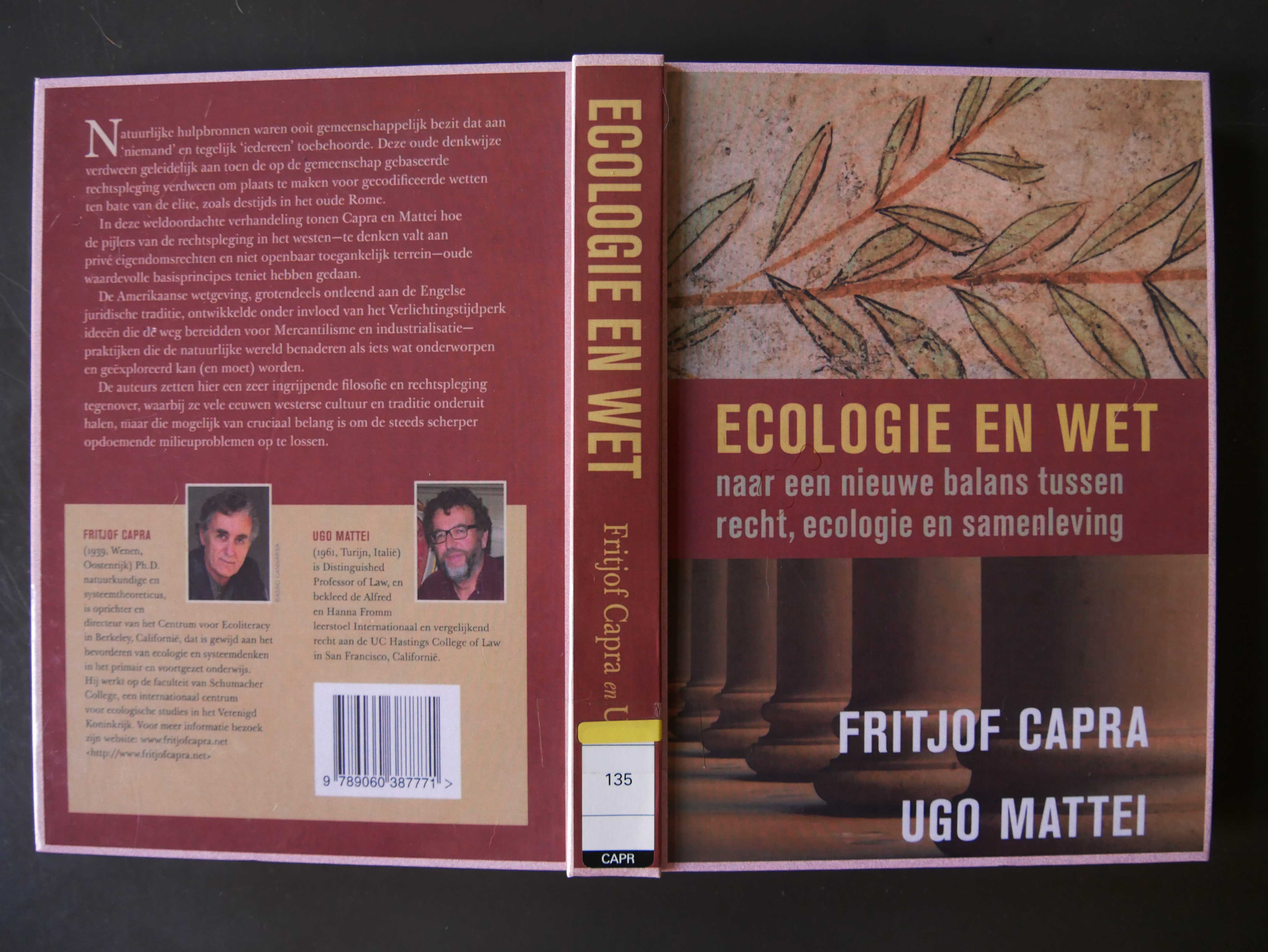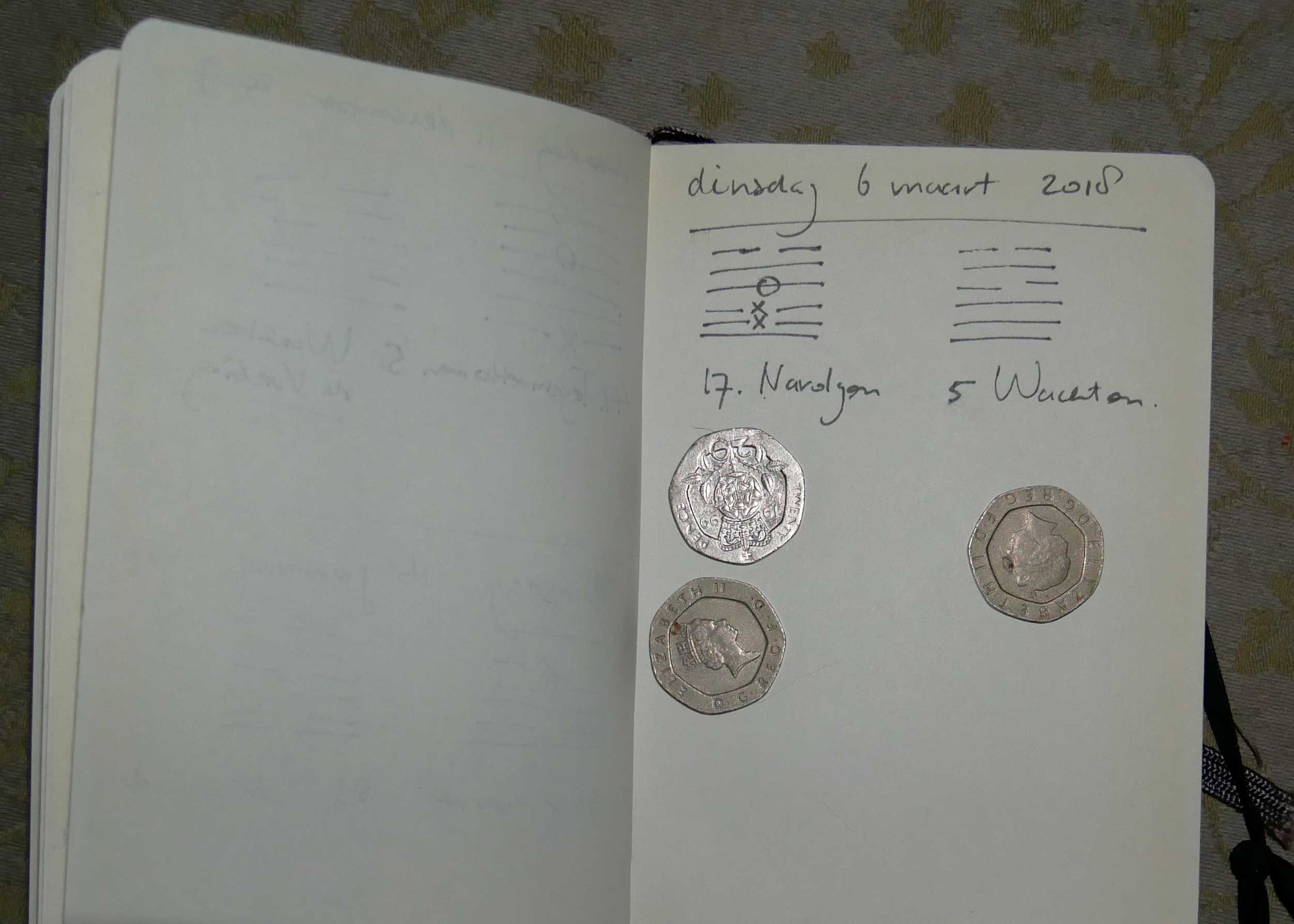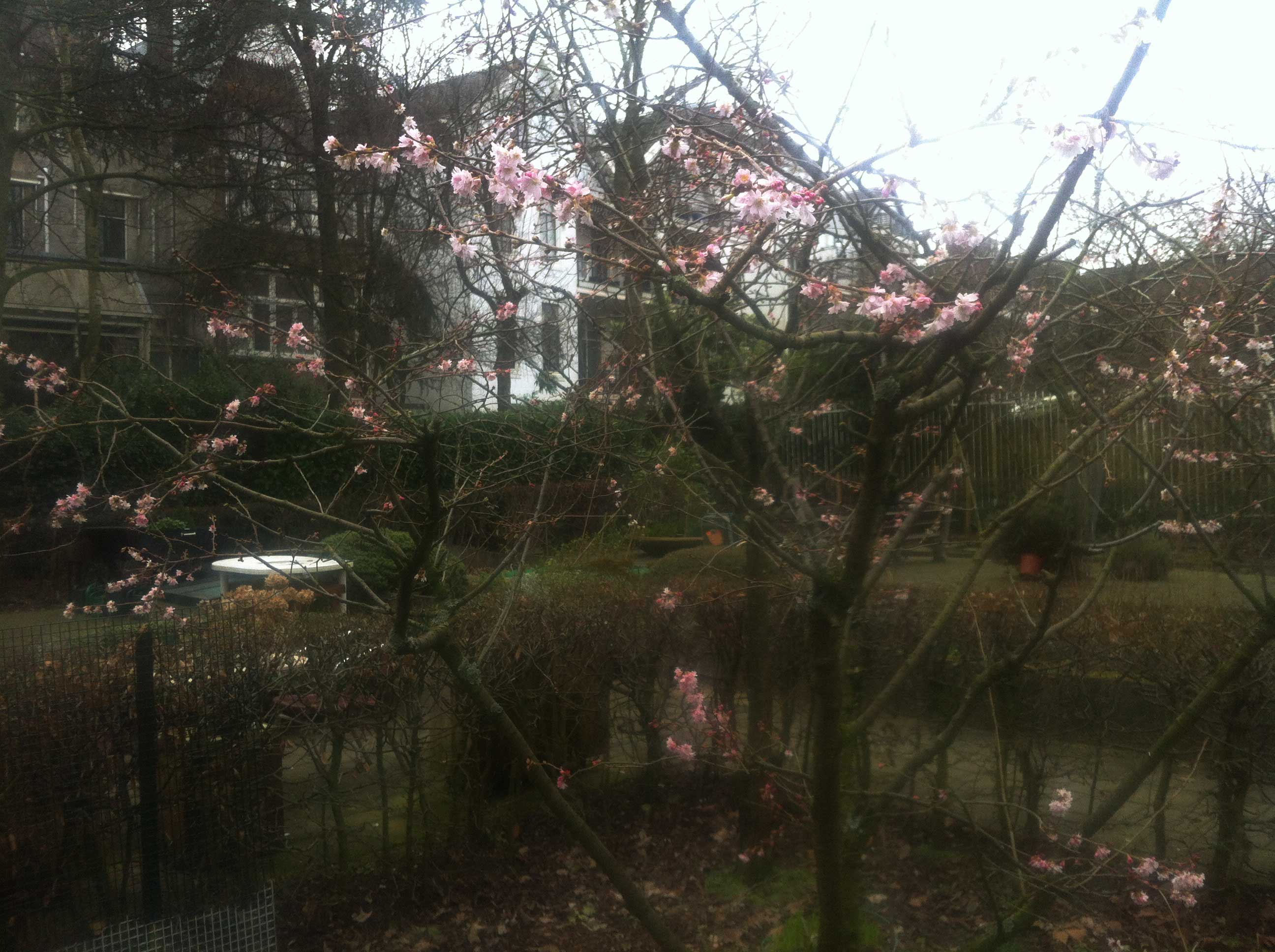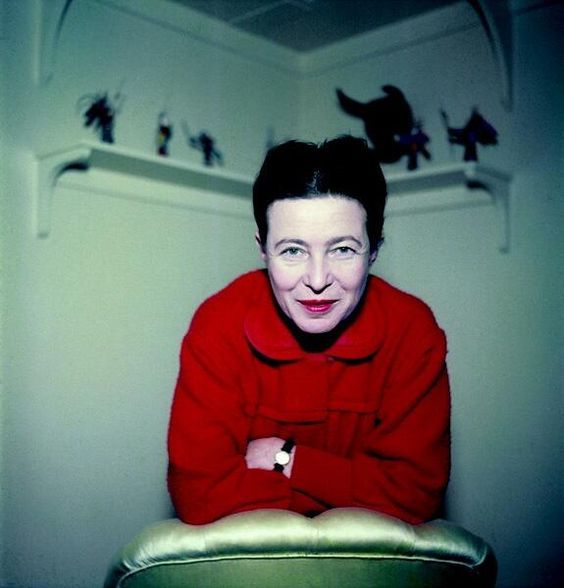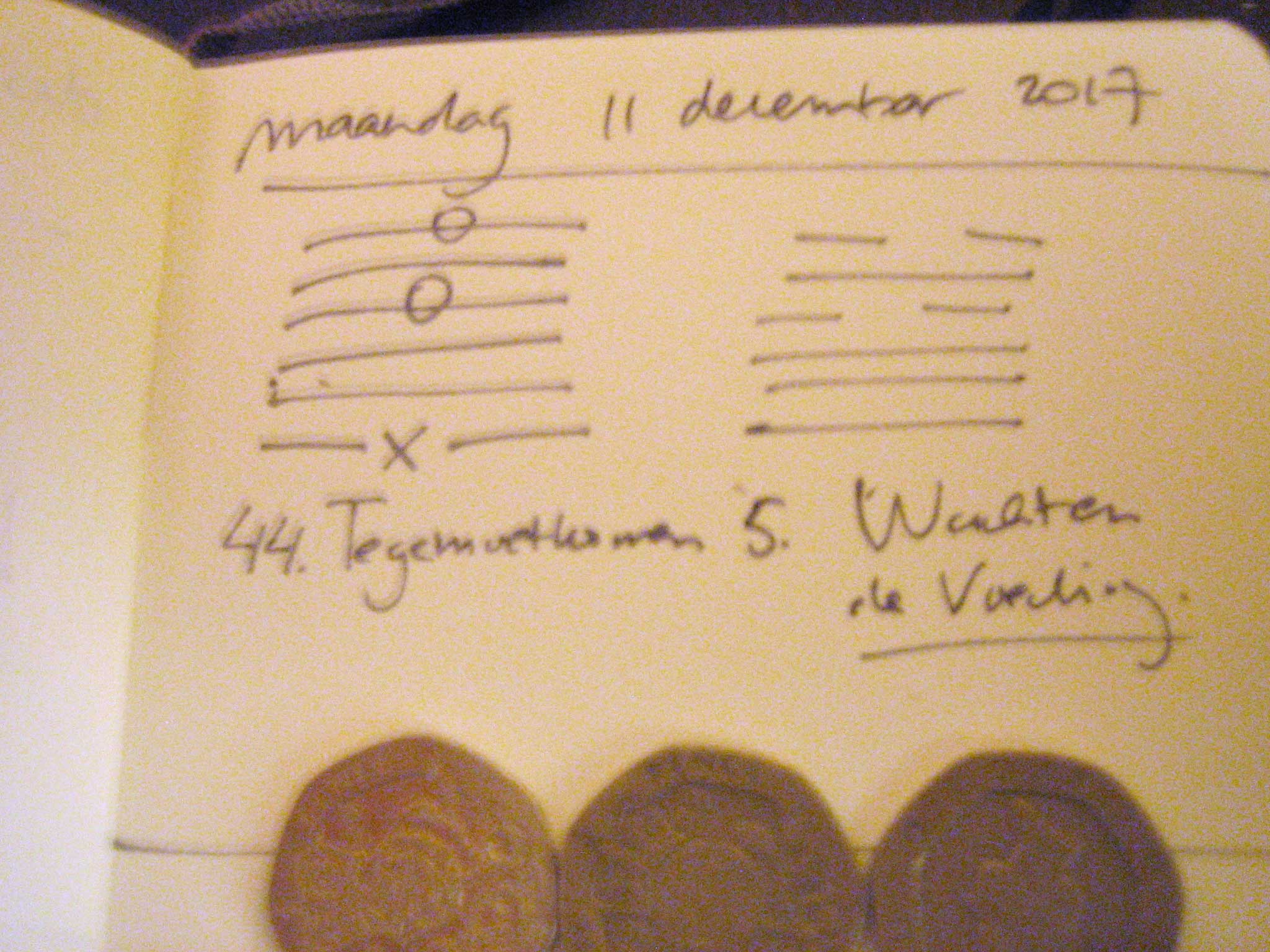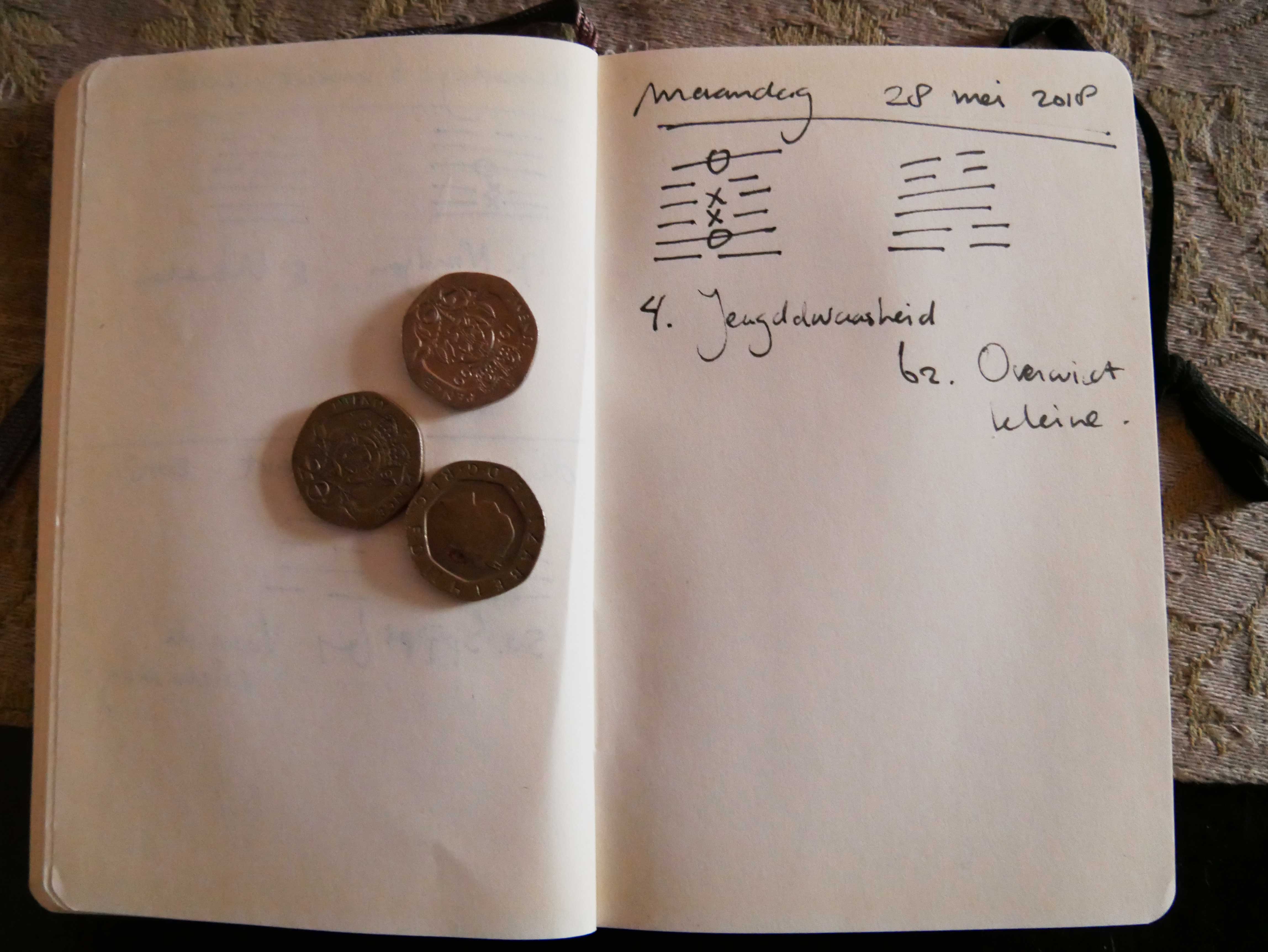
Preponderance of the Small
above KêN KEEPING STILL, MOUNTAIN
below K’AN THE ABYSMAL, WATERIn this hexagram we are reminded of youth and folly in two different ways. The image of the upper trigram, Kên, is the mountain, that of the lower, K’an, is water; the spring rising at the foot of the mountain is the image of inexperienced youth. Keeping still is the attribute of the upper trigram; that of the lower is the abyss, danger. Stopping in perplexity on the brink of a dangerous abyss is a symbol of the folly of youth. However, the two trigrams also show the way of overcoming the follies of youth. Water is something that of necessity flows on. When the spring gushes forth, it does not know at first where it will go. But its steady flow fills up the deep place blocking its progress, and success is attained.
THE JUDGMENT
YOUTHFUL FOLLY has success.
It is not I who seek the young fool;
The young fool seeks me.
At the first oracle I inform him.
If he asks two or three times, it is importunity.
If he importunes, I give him no information.
Perseverance furthers.In the time of youth, folly is not an evil. One may succeed in spite of it, provided one finds an experienced teacher and has the right attitude toward him. This means, first of all, that the youth himself must be conscious of his lack of experience and must seek out the teacher. Without this modesty and this interest there is no guarantee that he has the necessary receptivity, which should express itself in respectful acceptance of the teacher. This is the reason why the teacher must wait to be sought out instead of offering himself. Only thus can the instruction take place at the right time and in the right way.
A teacher’s answer to the question of a pupil ought to be clear and definite like that expected from an oracle; thereupon it ought to be accepted as a key for resolution of doubts and a basis for decision. If mistrustful or unintelligent questioning is kept up, it serves only to annoy the teacher. He does well to ignore it in silence, just as the oracle gives one answer only and refuses to be tempted by questions implying doubt.
Given addition a perseverance that never slackens until the points are mastered one by one, real success is sure to follow. Thus the hexagram counsels the teacher as well as the pupil.THE IMAGE
A spring wells up at the foot of the mountain:
The image of YOUTH.
Thus the superior man fosters his character
By thoroughness in all that he does.A spring succeeds in flowing on and escapes stagnation by filling up all the hollow places in its path. In the same way character is developed by thoroughness that skips nothing but, like water, gradually and steadily fills up all gaps and so flows onward.
THE LINES
° Nine in the second place means:
To bear with fools in kindliness brings good fortune.
To know how to take women
Brings good fortune.
The son is capable of taking charge of the household.These lines picture a man who has no external power, but who has enough strength of mind to bear his burden of responsibility. He has the inner superiority and that enable him to tolerate with kindliness the shortcomings of human folly. The same attitude is owed to women as the weaker sex. One must understand them and give them recognition in a spirit of chivalrous consideration. Only this combination of inner strength with outer reserve enables one to take on the responsibility of directing a larger social body with real success.
Six in the third place means:
Take not a maiden who. When she sees a man of bronze,
Loses possession of herself.
Nothing furthers.A weak, inexperienced man, struggling to rise, easily loses his own individuality when he slavishly imitates a strong personality of higher station. He is like a girl throwing herself away when she meets a strong man.
Such a servile approach should not be encouraged, because it is bad both for the youth and the teacher. A girl owes it to her dignity to wait until she is wooed. In both cases it is undignified to offer oneself, and no good comes of accepting such an offer.Six in the fourth place means:
Entangled folly bring humiliation.For youthful folly it is the most hopeless thing to entangle itself in empty imaginings. The more obstinately it clings to such unreal fantasies, the more certainly will humiliation overtake it.
Often the teacher, when confronted with such entangled folly, has no other course but to leave the fool to himself for a time, not sparing him the humiliation that results. This is frequently the only means of rescue.Nine at the top means:
In punishing folly
It does not further one
To commit transgressions.
The only thing that furthers
Is to prevent transgressions.Sometimes an incorrigible fool must be punished. He who will not heed will be made to feel. This punishment is quite different from a preliminary shaking up. But the penalty should not be imposed in anger; it must be
restricted to an objective guarding against unjustified excesses. Punishment is never an end in itself but serves merely to restore order.
This applies not only in regard to education but also in regard to the measures taken by a government against a populace guilty of transgressions. Governmental interference should always be merely preventive and should have as its sole aim the establishment of public security and peace.
62. Hsiao Kuo / Preponderance of the Small
above CHêN THE AROUSING, THUNDER
below KêN KEEPING STILL, MOUNTAINWhile in the hexagram Ta Kuo, PREPONDERANCE OF THE GREAT (28), the strong lines preponderate and are within, inclosed between weak lines at the top and bottom, the present hexagram has weak lines preponderating, though here again they are on the outside, the strong lines being within. This indeed is the basis of the exceptional situation indicated by the hexagram. When strong lines are outside, we have the hexagram I, PROVIDING NOURISHMENT (27), or Chung Fu, INNER TRUTH, (61); neither represents and exceptional state. When strong elements within preponderate, they necessarily enforce their will. This creates struggle and exceptional conditions in general. But in the present hexagram it is the weak element that perforce must mediate with the outside world. If a man occupies a position of authority for which he is by nature really inadequate, extraordinary prudence is necessary.
THE JUDGMENT
PREPONDERANCE OF THE SMALL. Success.
Perseverance furthers.
Small things may be done; great things should not be done.
The flying bird brings the message:
It is not well to strive upward,
It is well to remain below.
Great good fortune.Exceptional modesty and conscientiousness are sure to be rewarded with success; however, if a man is not to throw himself away, it is important that they should not become empty form and subservience but be combined always with a correct dignity in personal behavior. We must understand the demands of the time in order to find the necessary offset for its deficiencies and damages. In any event we must not count on great success, since the requisite strength is lacking. In this lies the importance of the message that one should not strive after lofty things but hold to lowly things.
The structure of the hexagram gives rise to the idea that this message is brought by a bird. In Ta Kuo, PREPONDERANCE OF THE GREAT (28), the four strong, heavy lines within, supported only by two weak lines without, give the image of a sagging ridgepole. Here the supporting weak lines are both outside and preponderant; this gives the image of a soaring bird. But a bird should not try to surpass itself and fly into the sun; it should descend to the earth, where its nest is. In this way it gives the message conveyed by the hexagram.THE IMAGE
Thunder on the mountain:
The image of PREPONDERANCE OF THE SMALL.
Thus in his conduct the superior man gives preponderance to reverence.
In bereavement he gives preponderance to grief.
In his expenditures he gives preponderance to thrift.Thunder on the mountain is different from thunder on the plain. In the mountains, thunder seems much nearer; outside the mountains, it is less audible than the thunder of an ordinary storm. Thus the superior man derives an imperative from this image: he must always fix his eyes more closely and more directly on duty than does the ordinary man, even though this might make his behavior seem petty to the outside world. He is exceptionally conscientious in his actions. In bereavement emotion means more to him than ceremoniousness. In all his personal expenditures he is extremely simple and unpretentious. In comparison with the man of the masses, all this makes him stand out as exceptional. But the essential significance of his attitude lies in the fact that in external matters he is on the side of the lowly.
